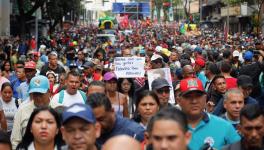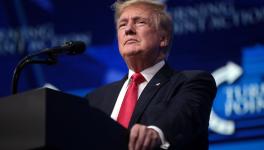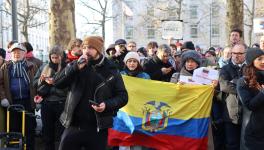Return of the ‘Pink Tide’ in Brazil
Brazil’s former president Luiz Inácio Lula da Silva
Brazil’s former president Luiz Inácio Lula da Silva has hit the political turf running. He was catapulted back on to the frontline of Brazilian politics only on Monday by the surprise decision of the country’s Supreme Court to declare that the anti-corruption operation that scuppered Lula’s bid to reclaim presidency in the 2018 presidential election was “the greatest judicial scandal” in the country’s history.
By Wednesday, Lula had delivered a stirring and potentially historic address widely seen as the start of a bid to wrestle the presidency back. Lula excoriated the far-right incumbent president Jair Bolsonaro’s “moronic” and bungling response to the coronavirus pandemic. Brazilian politics is in turmoil already following Bolsonaro’s ineptitude and denialism for the scale of a Covid crisis which has killed nearly 270,000 people.
A poll result last weekend showed that 50% of Brazilians might or would definitely vote for Lula at the next election compared with just 38% for Bolsonaro. To be sure, Lula’s rehabilitation electrifies the 2022 election and a titanic clash between the so-called “Pink Tide” and toxic right-wing populism is on the cards. (The manifestations of a broader Latin American shift to the left have been labeled the “Pink Tide” to contrast the more moderate policies of governments with the hemisphere’s historically hard-line or “red” leftist movements.)
Clearly, Lula remains a much-loved figure revered for his crusade against poverty. The halcyon days of economic boom that Brazil witnessed during his 8-year stewardship as president is viewed with nostalgia. Lula turned away from the extremes and toward more pragmatic approaches to the persistent challenges of poverty, inequality and economic development in his country.
Brazil’s emergence as the regional lynchpin in the western hemisphere would have remained incomplete without Lula’s magnificent contribution to navigating the country’s economy towards record growth, which, in turn, helped fund the social investments that halved extreme wealth inequality in the country. Between 2003 and 2013, Brazil’s gross domestic product grew 64% and the percentage of the population living in poverty was halved. In addition, social spending grew significantly, the minimum wage increased by 75% in real terms and millions of new formal jobs were created every year.
The icon of the left in US politics, Senator Bernie Sanders has effusively welcomed Lula’s return to active politics. He tweeted on Wednesday, “As President, Lula did incredible work to lower poverty in Brazil and to stand up for workers. It is great news that his highly suspect conviction has been annulled. This is an important victory for democracy and justice in Brazil.”
Sanders’ commendation shows no trace of apprehension that a veteran leftist is likely to return to power in Brazil and that might put the three biggest and most influential countries in Latin America — Brazil, Argentina and Mexico — under the “Pink Tide.” It speaks something of the kind of diplomacy and politics that Lula can be expected to pursue alongside presidents Alberto Fernández (Argentina) and Andrés Manuel López Obrador (Mexico).
Yet unlike Fernández and Obrador, who are accomplished intellectuals, Lula had little formal education. He did not learn to read until he was ten years old, and quit school after the second grade to work and help his family. His first job at age 12 was as shoeshiner and street vendor. By 14 he had a formal job in a warehouse.
Lula’s rose in politics as a trade union leader with solid working class background, but he, typically, made up for his inadequacies, if any, while founding the Workers’ Party — a left-wing party with progressive ideas created in the midst of Brazil’s military government in 1980 — with a collegium of union leaders and a group of academics and intellectuals at its party’s helm.
Lula as president provided a firewall against the US-led efforts to destabilise the more radical processes taking place in Ecuador, Bolivia and Venezuela, although they were not quite travelling on his ideological trajectory. The initiatives such as the Union of South American Nations and the Community of Latin American and Caribbean States, that sought the greater integration of the region, enjoyed his backing. This, along with his brand of socialism, connoted a foreign-policy shift on his watch that had anti-imperialist overtones and earned the US establishment’s antipathy toward his movement but he was never overtly anti-American. Lula was acutely conscious that Brazil needed trade and investment with the West, especially access to the US market.
What probably irritated Washington most was that Lula’s Brazil was an active participant in the BRICS group of nations. The idea that BRICS was conceived as an alternative economic and political pole to the G7 nations held great appeal for Lula personally. However, from Washington’s viewpoint, BRICS was (and it still is) a pernicious idea, given the challenge it posed to the international order led by the US with its supply chains, divisions of labour, and, of course, the dominance of the American dollar.
The outgoing US Secretary of State Pompeo, in fact, didn’t forget to say a toast to Lula’s ouster from politics in one of his last messages while retiring from the state department. On January 19, Pompeo tweeted with a barely-disguised sense of triumphalism that with Bolsonaro leading Brazil and Prime Minister Narendra Modi leading India, BRICS had become comatose, implying that the two statesmen could be counted upon to smother any anti-American whiff within the grouping at the behest of Russia and/or China:
Remember BRICS? Well, thanks to @jairbolsonaro and @narendramodi the B and the I both get that the C and the R are threats to their people.
Viva BRICS! Pompeo’s dream lies shattered. And Modi is due to host BRICS Summit 2021.
Suffice to say, although Lula was not a Marxist or an anti-American demagogue, his comeback to Brazilian politics could potentially become a major setback for Washington’s designs to restore its hegemony in the region at a juncture when the conservative wave that followed the “Pink Tide” is steadily ebbing in the hemisphere and the US’ global strategy has turned to countering China and Russia everywhere, anywhere, globally, especially in America’s backyard.
Without doubt, if Lula gets elected as president next year, that would re-energise the BRICS. Moscow and Beijing would view Lula as an ally with rooted conviction in the raison d’etre of the bloc as an institution that would more genuinely support development and build the foundations for a multipolar world.
How the Joe Biden Administration adapts itself to such a geopolitical reality remains to be seen. Bolsonaro had forged close ties with the Trump administration, and the brash Brazilian leader is likely to face hostility from Biden. (Bolsonaro is often called the “Tropical Trump” by his countrymen.)
On Nov 7, Lula said the world was “breathing a sigh of relief” at Biden’s victory while Bolsonaro, a fervent Trump backer, remained conspicuously silent. Lula tweeted: “I welcome Biden’s victory and express my hope that he will be guided by the humanist values that marked his campaign, not only domestically but in his relations with Latin America and the world.”
When Biden said in his first debate with Trump that the US needed to push Brazil to better protect the Amazon rainforest, Bolsonaro fired back that the statement was “disastrous and unnecessary”. Indeed, some Brazilian media reports, citing government sources, had said the Bolsonaro administration did not plan to recognise Biden’s win until the various legal challenges Trump had threatened to wage played out in court. Today, indeed, if Biden wants to push back against right-wing populism in Brazil, he won’t have to look past Lula.
Get the latest reports & analysis with people's perspective on Protests, movements & deep analytical videos, discussions of the current affairs in your Telegram app. Subscribe to NewsClick's Telegram channel & get Real-Time updates on stories, as they get published on our website.





















